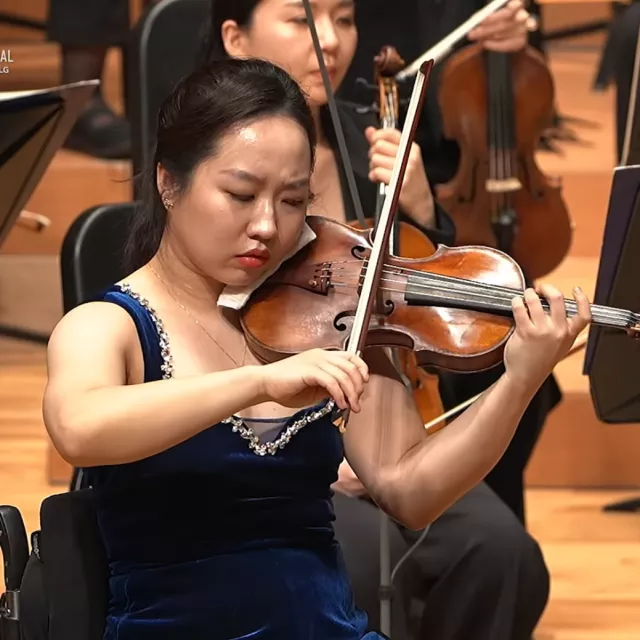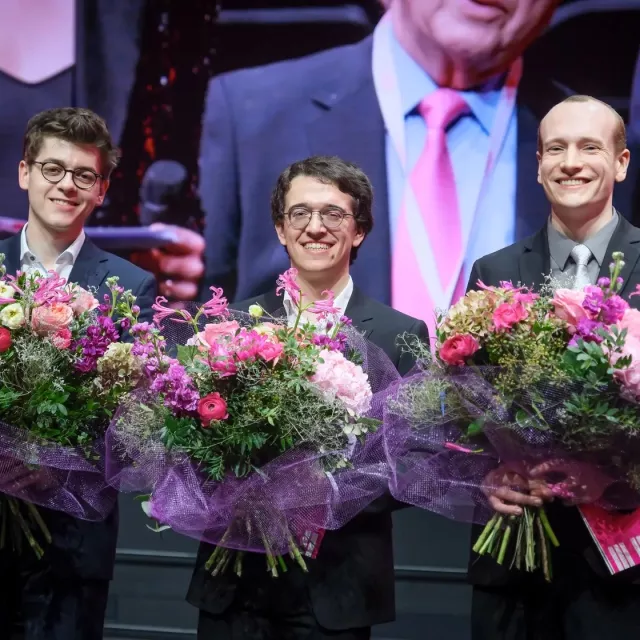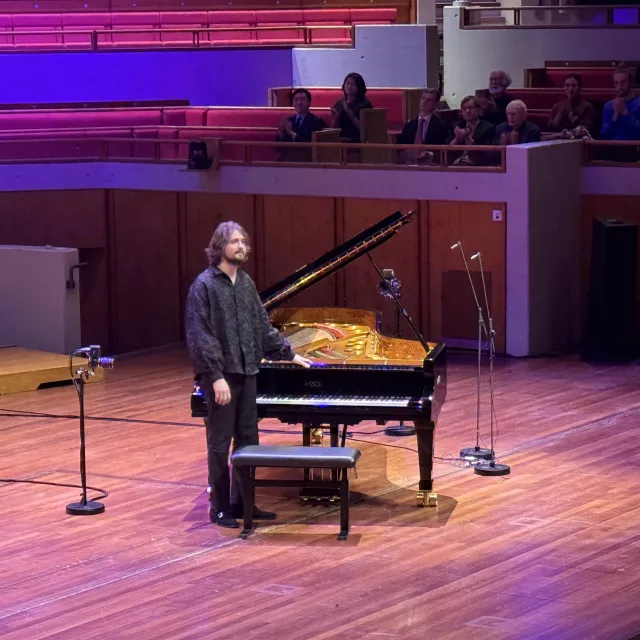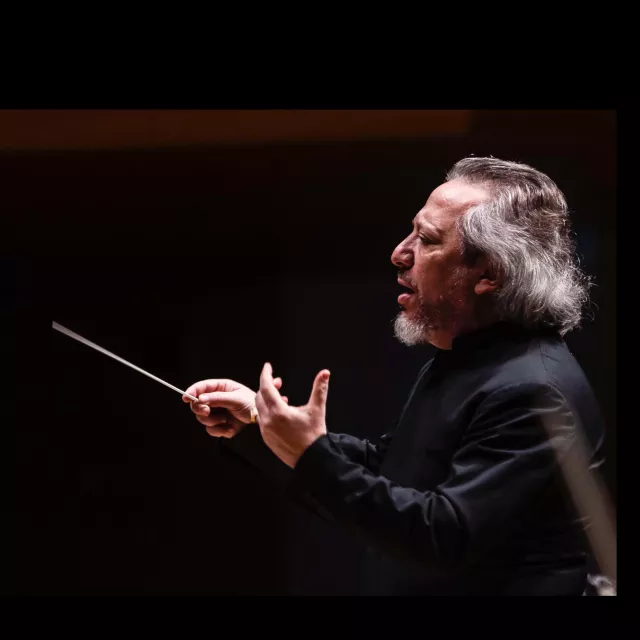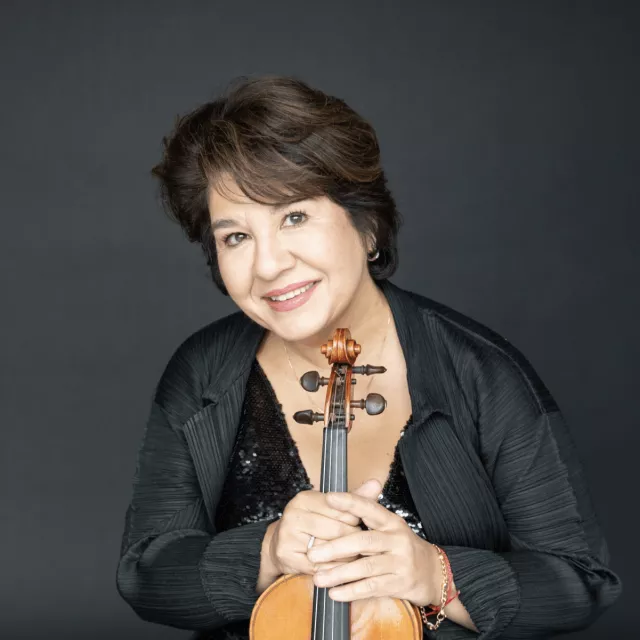Jörg Widmann is this year’s composer in residency at the Festival. He is not only an internationally acclaimed composer, but also a virtuoso clarinetist and renown conductor. The weeklong programme included a great variety of his works for clarinet, flute, harp, string orchestra, ten brass instruments, and more. Both Trondheim Soloists and the Trondheim Symphony Orchestra offered great presentations of his music. NTNU (Norwegian University of Science and Technology) clarinet students received coaching from him and performed his “Bayerisch-Babylonischer March”. His artistry and generosity attracted a large number of people.
Inspired finals at the Trondheim Chamber Music Competition
The Trondheim Kamfest celebrates its 30th birthday with panache!
What the university town of Trondheim in the middle of Norway has to offer is huge. The Trondheim Chamber Music Competition is part of a great music festival that takes place every year at the end of September. Alongside the Competition, many concerts are offered to packed audiences: classical or folk music of all kinds, even unique performances with instruments made of ice, presented in various places: intimate spaces like the Dokkhuset- a complex combining a performance hall and restaurant resembling a jazz cellar where everyone is free to listen with a drink in hand; the POMO Museum; at the big Freemason’s Hall; in people’s living rooms; outdoor by the Harbor; or immersed in a 360° ocean film with live music at a Planetarium.
People from the city, from all over Norway and from abroad gather every year to attend creative musical performances, masterclasses, conferences, and discover young musicians and new compositions.
The competition benefits from all the excitement surrounding the festival and further highlights the importance of young talents who have come to compete against the world's elite in classical chamber music.
The Jury, led by Levon Chilingirian, was impressed by the high standard of playing of the young quartet players. “After the first round, and after having heard ten fantastic concerts, we could understand how diverse the opinions among the Jury were, because each member has his own feelings and thoughts. And that is wonderful.” Calling chamber music, and more specifically, string quartet "the most intimate form of making music", Chilingirian stressed it was no coincidence that all great composers since Haydn composed for string quartet.
The whole competition took place in the beautiful Freemason Hall, with impeccable accoustics. The second round showed a lot about the musicians: they were able to built their own programmes in order to show their thoughts, beliefs, and passions. Three ensembles convinced the Jury members in the end:
Motus Quartet with their “Conversation across Centuries” programme showed obvious enjoyment in playing together, expressing their technique, artistry and intense emotions in works as diverse as Haydn's Lobkowitz Quartet Op. 77/2, Beethoven Quartet Op. 135 and a moving work by Caroline Shaw, “Entr’acte”.
Erinys Quartet showed beautiful expressiveness and artistic finesse in their programme that started with Wolf’s Italian Serenade, followed by a haunting and powerful “Terra Memoria” by Saariaho and culminated in Bartók’s Quartet n°3.
Absalon String Quartet was the last to perform in this second round: The musicians demonstrated wonderful cohesion, clear dynamism, and great elegance throughout their program, from Beethoven’s Quartet Op. 95 "serioso" to a vibrant Bartók Quartet n°5, and including the sublime piece “Source Code” by American violinist and composer Jessie Montgomery.
The final round confirmed the great artistry of each quartet: all three ensembles interpreted Ståle Kleiberg’s commission “A Pastoral Elegy” in their very own way, infusing it with their emotions—dreaminess for some, energy for others—enveloping the audience in magnificent music. The Norwegian composer, present in the hall, was overwhelmed with their different interpretations. Other pieces were convincingly performed that evening: Beethoven’s Quartet Op. 127 (Erinys Quartet) and Schubert’s "Death and the Maiden", interpreted by both Motus and Absalon String Quartets.
After deliberation the jury finally awarded First Prize to Erinys Quartet, Second Prize to Absalon String Quartet and Third Prize to Motus Quartet. The audience voted for Absalon String Quartet, while the commissioned piece award went to the Motus Quartet.
The Erinys Quartet are Elizabeth Steward, violin, Joosep Reimaa, violin, Marija Raisanen, viola, Stergios Theodoridis, cello. Named for the Erinyes (a.k.a. the Furies) from the Greek tragedy Oresteia by Aeschylus, and with roots in Estonia, Lithuania, Greece, the United States and Finland, the Erinys Quartet was founded in 2018 at the Sibelius Academy in Helsinki where they worked closely with cellist Marko Ylönen. Since Autumn 2023 Erinys has been the Nina von Maltzahn String Quartet-in-Residence at the Curtis Institute of Music in Philadelphia, PA (USA). In the 2025 season the Erinys Quartet will present concerts throughout the United States and Europe, including debuts at the Philadelphia Chamber Music Society and the Lucerne Festival in Switzerland. In addition to their studies at Curtis with the Dover Quartet, Erinys is pursuing a diploma in chamber music at Escuela Superior de Música Reina Sofía in Madrid, Spain under the tutelage of Professor Günter Pichler of the Alban Berg Quartet.
Absalon String Quartet consists of violinists Thera Ortved and Andreas Larsen, Alva Rasmussen on viola and Hedda Aadland on cello. Currently enrolled in a 2-year chamber music master program at the Robert Schumann Hochschule in Düsseldorf with prof. Eckart Runge (Artemis Quartett), they also receive regular coaching from prof. Tim Frederiksen at the Royal Danish Academy of Music. Additionally, the quartet have participated in many masterclasses across Europe, with organisations such as ECMA and ProQuartet - among others they’ve enjoyed lessons from Eberhard Feltz, Johannes Meissl, Hélène Clement (Doric String Quartet), Eugene Drucker (Emerson Quartet), David Harrington (Kronos Quartet) and all members of the Danish String Quartet, as well as with renowned composers Missy Mazzoli and Jessie Montgomery.
The Motus Quartet was founded in October 2022 and consists of Tim de Vries and Karla Križ, violin, Erin Pitts, viola and Domonkos Hartmann, cello. They currently study with Johannes Meissl at the University for Music and Performing Arts Vienna (mdw). Further musical impulses have come from Hatto Beyerle, Eckart Runge, the Jerusalem Quartet, the Danish String Quartet, Tim Fredriksen, Minna Pensola, Peter Schuhmayer, Patrick Jüdt, Bjørg Lewis and Avedis Kouyoumdjian, among others. The quartet is also privileged to have worked with composer György Kurtág on various pieces including his own composition „12 Microludes for string quartet, Op. 13”. Most recently, the quartet has been awarded the first prize and the special prize for the best interpretation of an early classical work at the 10th International Joseph Joachim Chamber Music Competition. The Motus Quartet regularly takes part in ECMA (European Chamber Music Academy) and Musethica sessions all over Europe. The Motus Quartet has given debut concerts at the Konzerthaus Vienna, the Musikverein Vienna and the Amsterdam Concertgebouw, with their Wigmore Hall debut scheduled for January 2026. Recent concert engagements brought the ensemble to most of Europe, Asia, Africa and North America.
Laureates:
First Prize: Erinys Quartet
Second Prize and audience Prize: Absalon String Quartet
Third Prize and Prize for the best interpretation of the commissioned piece: Motus Quartet
Jury:
Levon Chilingirian (chair), Asbjørn Nørgaard, Bjørg Lewis, Øyvor Volle, Minna Pensola, Radovan Vlatković and Tomas Djupsjöbacka.
Artist:
Ståle Kleiberg, composer
©WFIMC 2025/SB









